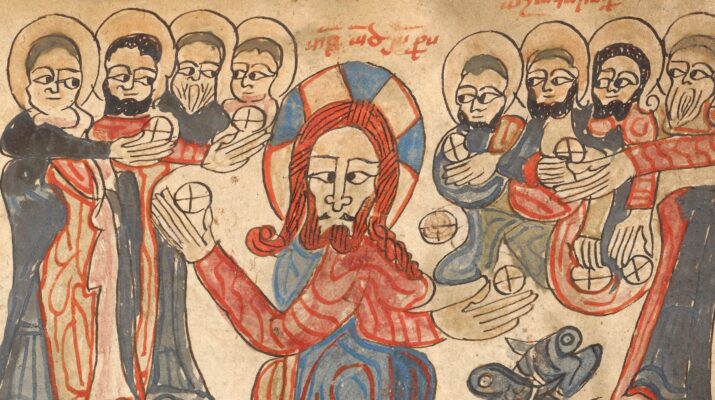Mark 6:7-13
NL 240
7 He calledA the twelveB and beganC to send them outD
A “called” = proskaleo. From pros (at, to, toward, with) + kaleo (to call by name, invite, to name, bid, summon, call aloud); {related to keleuo (to command, order, direct); from kelomai (to urge on)}. This is to call to oneself, summon.
B “twelve” = dodeka. From duo (two, both) + deka (ten). This is twelve – also shorthand for the apostles.
C “began” = archomai. From archo (to rule, begin, have first rank or have political power). This is to begin or rule.
D “send…out” = apostello. From apo (from, away from) + stello (to send, set, arrange, prepare, gather up); {probably from histemi (to make to stand, stand, place, set up, establish, appoint, stand firm, be steadfast)}. This is to send forth, send away, dismiss, send as a messenger. It implies one that is sent for a particular mission or purpose rather than a quick errand. This is where “apostle” comes from.
twoE by two and gaveF them authorityG over the uncleanH spirits.I
E “two” = duo. Related to “twelve” in v7. See note B above.
F “gave” = didomi. To give, offer, place, bestow, deliver. This is give in a literal or figurative sense.
G “authority” = exousia. From exesti (to be permitted or lawful); {from ek (out, out of) + eimi (to be, exist)}. This is power to act or weight. It especially denotes moral authority or influence. It can mean domain, liberty, freedom, capacity, mastery, right, force, or strength.
H “unclean” = akathartos. From a (not, without) + kathairo (to cleanse or purify by purging out unwanted elements); {from katharos (clean, clear, pure, unstained; clean in a literal, ritual, or spiritual sense; so, also guiltless, innocent or upright; something that is pure because it has been separated from the negative substance or aspect; spiritually clean because of God’s act of purifying)}. This is unclean or impure, whether a thing or a person. It is something that is not mixed with something that would taint. This is unclean in a ritual or moral sense. It can also mean demonic or foul.
I “spirits” = pneuma. From pneo (to blow, breathe, breathe hard). This is wind, breath, or ghost. A breeze or a blast or air, a breath. Figuratively used for a spirit, the human soul or part of us that is rational. It is also used supernaturally for angels, demons, God, and the Holy Spirit. This is where pneumonia comes from.
8 He orderedJ them to takeK nothing for their journeyL
J “ordered” = paraggello. From para (from beside, by) + aggello (to announce, report) {from aggelos (angel, messenger – supernatural or human envoy of God); probably from ago (lead, bring, drive, carry, guide, go)}. This is to send a message, order, notify, command. It is a charge – a proper command as a military term that has followed proper channels. It can also mean to entreat solemnly.
K “take” = airo. This is to lift up in a literal or figurative sense. So, it could mean to lift, carry, or raise. It could also imply lifting something in order to take it away or remove it. Figuratively, this can be used for raising the voice or level of suspense. It can mean sailing off as raising the anchor. It can also correspond to a Hebrew expression for atonement of sin (lift/remove sin).
L “journey” = hodos. This is way, road, path, or journey. It can imply progress along a route.
except a staff:M, N no bread,O no bag,P no moneyQ in their belts,R
M “staff” = rhabdos. 12x in NT. Perhaps from the base of rhapizo (to hit with a rod or to slap); from rhepo (to let fall, to rap). This is staff, rod, cudgel. It is a staff that signifies power, royalty, or authority.
N {untranslated} = monon. From monos (alone, single, remaining, mere, desolate); from meno (to stay, abide, wait, endure). This is merely, only, simply, sole. It can also imply alone.
O “bread” = artos. Related to “take” in v8. Perhaps from airo (see note K above). This is bread or a loaf. It is a loaf as raised.
P “bag” = pera. 6x in NT. This is a wallet or leather pouch – can carry food or money.
Q “money” = chalkos. 5x in NT. Perhaps from chalao (let down, slacken, loosen). This is copper or bronze. Can also mean things made of brass – money, instruments.
R “belts” = zone. 8x in NT. From zonnumi (to gird up – to tighten the belt so one can work or move quickly). This is belt, sash, waistband – the place where one puts the purse.
9 but to wearS sandalsT and not to put onU two tunics.V
S “wear” = hupodeo. 3x in NT. From hupo (by, under, about, subordinate to) + deo (to tie, bind, fasten, impel, compel; to declare something against the law or prohibited). This is to bind under, wear on the feet.
T “sandals” = sandalion. 2x in NT. From sandalon (a sandal; or the sole of a shoe made from wood). This is a sandal or the pad for under the foot. It is where the word “sandal” comes from.
U “put on” = enduo. From en (in, on, at, by, with, among) + duno (to sink into, set like the sun); {from duo (to go down, sink, or set)}. This is to put on as when one puts on clothes. It is the idea of sinking into one’s clothing.
V “tunics” = chiton. 11x in NT. From a Semitic language – see Hebrew kethoneth (tunic). Root means to cover. This is the garment worn beneath the cloak or robe – the one that is closest to the skin.
10 He saidW to them, “Wherever you enterX a house,Y stayZ there until you leaveAA the place.
W “said” = eiron. This is to speak say, answer, command.
X “enter” = eiserchomai. From eis (to, into, for, among) + erchomai (to come, go). This is to go in in a literal or figurative sense.
Y “house” = oikia. From oikos (house – the building, the household, the family, descendants; the temple). This is a house, household, goods, property, family, or means.
Z “stay” = meno. Related to {untranslated} in v8. See note N above.
AA “leave” = exerchomai. Related to “enter” in v10. See note N above.
11 If any placeBB will not welcomeCC you and they refuse to hearDD you, as you leave,EE
BB “place” = topos. This is a place or region. It is a smaller space that can only hold a limited number of people whereas chora is a larger place. Figuratively it could be an opportunity.
CC “welcome” = dechomai. This is to warmly receive, be ready for what is offered, take, accept, or welcome. It is to receive in a literal or figurative sense.
DD “hear” = akouo. This is hear or listen, but it also means to understand by hearing. This is where the word “acoustics” comes from.
EE “leave” = ekporeuomai. From ek (from, from out of) + poreuomai (to go, travel, journey, die; refers to transporting things from one place to another; focuses on the personal significance of the destination); {from poros (passageway)}. This is to go forth, depart from, be spoken, flow out, project. This word emphasizes the result a process or passage – how it impacts the person or thing.
shake offFF the dustGG that is on your feetHH
FF “shake off” = ektinasso. 4x in NT. From ek (from, from out of) + tinasso (to swing). This is shake off or out.
GG “dust” = choos. 2x in NT. See chous (earth, dust, soil); {from cheo (to pour)} OR from choos (dust, soil, earth, loose dirt, rubbish); {from cheimon (winter, storm); from the same as cheimazo (be storm-tossed, exposed to the winter chill); from chasma (chasm, gap, gulf); from chasko (to yawn)}. This is dust or soil. It can imply that it is poured into a mound – loose earth.
HH “feet” = pous. This is foot in a literal or figurative sense.
as a testimonyII against them.”JJ
II “testimony” = marturion. 19x in NT. From martus (a witness whether having heard or seen something; witness literally, judicially, or figuratively; by analogy, a martyr). This is something that counts as evidence whether a witness, testimony, or other proof.
JJ Some manuscripts add “truly I say to you it will be more tolerable for Sodom or Gomorrah in the day of judgment than for that town” = amen + lego + su + anektoteros + eimi + Sodoma + e + Gomorra + en + hemera + krisis + e + ho + polis + ekeinos. Amen is from Hebrew amen (verily, truly, amen, truth, so be it, faithfulness); from aman (to believe, endure, fulfill, confirm, support, be faithful, put one’s trust in, be steadfast. Figuratively, this is to be firm, steadfast, or faithful, trusting, believing, being permanent, morally solid). This word is literally firmness, but figuratively fidelity, faithfulness, honesty, responsibility, trust, truth, steadfastness. Properly, it is to be sure, certain, or firm. This is a word of emphasis indicating that something crucial follows. Lego is to speak, say, name, call, command. It is generally to convey verbally. Anektoteros is 6x in NT. From anektos (bearable, tolerable); from anecho (to endure, bear with, tolerate, persist, put up with); {from ana (up, again, back, among, anew) + echo (to have, hold, possess)}. This is more tolerable or endurable. Eimi is related to “authority” in v7. See note G above. Sodoma is 10x in NT. Gomorra is 5x in NT. From Hebrew amorah (Amorah, Gomorrah; a ruined heap); from amar (to bind sheaves, heap; discipline as piling on blows). This is Gomorrah. Hemera is perhaps from hemai (to sit). This is day, time, or daybreak. Krisis is from krino (to judge, decide, think good, condemn, determine, pass judgment, stand trial, sue; judging whether in court or in a private setting; properly, mentally separating or distinguishing an issue – to come to a choice or decision, to judge positively or negatively in seeking what is right or wrong, who is innocent or guilty; can imply trying, condemning, punishing, or avenging). This is a judging or a sentence. It is often used of God’s judgment, but can also be any accusation or condemnation. This is where the word “crisis” comes from. Polis is a city or its inhabitants. It is a town of variable size, but one that has walls. This is where “metropolis” and “police” come from.
12 So they went outKK and proclaimedLL that all should repent.MM
KK “went out” = exerchomai. Same as “leave” in v10. See note AA above.
LL “proclaimed” = kerusso. This is to proclaim, preach, publish. Properly, it is to act as a herald – announcing something publicly with confidence and/or to persuade.
MM “repent” = metanoeo. From meta (with, among, after, beyond) + noieo (to perceive, think, understand); {from nous (mind, understanding, reasoning faculty, intellect, capacity to reflect)}. This is to change how one thinks, to reconsider, to repent. It refers to a change of thinking, which means a change of purpose and behavior.
13 They cast outNN manyOO demonsPP
NN “cast out” = ekballo. From ek (from, from out of) + ballo (to throw, cast, place, put, drop). This is to throw, put out, produce, expel, banish. It is eject in a literal or figurative sense.
OO “many” = polus. This is much, often, plenteous – a large number or a great extent.
PP “demons” = daimonion. From daimon (evil spirit, demon, fallen angel); perhaps from daio (giving out destinies). This is demon, evil spirit, god of another religion, or fallen angel.
and anointedQQ with oilRR many who were sickSS and curedTT them.
QQ “anointed” = aleipho. 9x in NT. From a (with) + liparos (oil, fatty; something luxurious); {from lipos (fat, grease)}. This is to anoint whether for medical reasons, as part of hospitality, for a dead body, for a celebration or festival, or to show respect.
RR “oil” = elaion. 11x in NT. From elaia (the olive tree or that which it produces; can also refer to the Mount of Olives). This is olive oil.
SS “sick” = arrostos. 5x in NT. From a (not, without) + rhonnumi (to strengthen, be firm, have health; used as a salutation in letters at the end); {probably from rhoomai (to move quickly) probably akin to rhoumai (to pull to oneself, rescue from danger, snatch up, set free); akin to eruo (to drag) or rheo (to flow, to flow like water, overflow)}. This is literally not strong so it refers to a chronic illness that persists. It is infirmity, feeble, or sick person.
TT “cured” = therapeuo. From therapon (servant, attendant, minister); perhaps from theros (properly heat and so used for summer); from thero (to heat). This is to serve, care, attend, heal, or cure. Since it means to attend to, it can be used for doctors, but also for those who serve God. So, it can mean worship. This is where the word “therapy” comes from.
Image credit: “The Feeding of the Five Thousand; Jesus Walking on the Water” by an unknown Armenian illuminator from 1386, Ms. Ludwig II 6, fol. 8.




